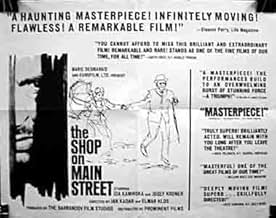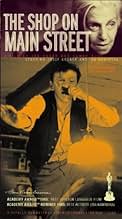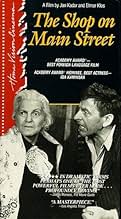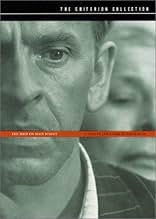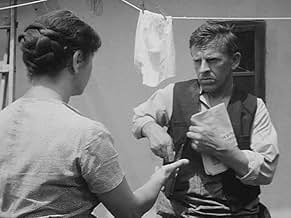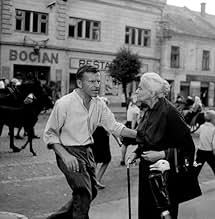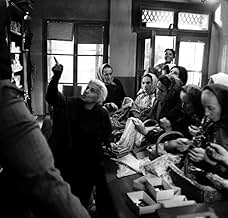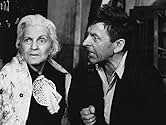IMDb RATING
8.2/10
10K
YOUR RATING
A carpenter in the Fascist Slovak State is appointed "Aryan controller" of a Jewish widow's store.A carpenter in the Fascist Slovak State is appointed "Aryan controller" of a Jewish widow's store.A carpenter in the Fascist Slovak State is appointed "Aryan controller" of a Jewish widow's store.
- Won 1 Oscar
- 6 wins & 4 nominations total
Ida Kaminska
- Rozalia Lautmannová
- (as Ida Kaminská)
Frantisek Zvarík
- Markus Kolkocký
- (as Frantisek Zvarík)
Ladislav Farkas
- Young Man
- (uncredited)
Luise Grossová
- Eliasová
- (uncredited)
Juraj Herz
- Jewish Man
- (uncredited)
Featured reviews
Words can hardly do justice to this gem. Understated cinematic grandeur, ultimate moral subtlety, acting without pair in the annals of movie history, philosophical and ethical depth without sententiousness . . . should I invent new superlatives to describe this indescribably touching movie?
Yes, the movie has to do with the tragedy of Jewish people in the poisoned and poisonous Europe of the WWII period, but the emotional implications go much farther than that. They address human condition in general. It is one of those egregiously few movies which make a "philosopher" out of each of us. . . even if for a minute only. . . even if we only philosophize with our unstoppable tears. I am not one to weep easily at movies, but I defy you to watch this fabulous work of cinema without being touched to the deepest fiber of your soul.
Yes, it is that good. One of the very few movies which are better than GREAT MUSIC. Watch it - preferably on the Criterion DVD, the VHS edition leaves a lot to be desired. Unless you are an unfeeling freak, no offense intended, it is very unlikely that you will ever regret it.
Yes, the movie has to do with the tragedy of Jewish people in the poisoned and poisonous Europe of the WWII period, but the emotional implications go much farther than that. They address human condition in general. It is one of those egregiously few movies which make a "philosopher" out of each of us. . . even if for a minute only. . . even if we only philosophize with our unstoppable tears. I am not one to weep easily at movies, but I defy you to watch this fabulous work of cinema without being touched to the deepest fiber of your soul.
Yes, it is that good. One of the very few movies which are better than GREAT MUSIC. Watch it - preferably on the Criterion DVD, the VHS edition leaves a lot to be desired. Unless you are an unfeeling freak, no offense intended, it is very unlikely that you will ever regret it.
This film is one of the most gripping stories told about Nazi occupied Europe. A small town in 1942 Czechoslovakia feels the changing regime envelop the people, pinning friends against one another, and turning even the most pacifistic men into traitors. Small-time carpenter Tony is married to an attractive, but constantly nagging and complaining, materialistic woman. Seeing her in-laws successful, while exploiting the political advantages of working with the Nazis, makes Tony's wife ever more determined to have a "piece of the fortune" the Jews are said to have been hording. Although refusing to work at a "tower of Babel" the Nazis are erecting as a symbol of their glory (and doing without the money he could have earned), Tony doesn't speak out against the "new order" either.
When Tony finds himself as assistant to an old lady at her failing notions shop (which he "legally" was entitled to take over), he learns about the Jewish community, how everyone looked out for one another, and how these people were no different from other folk in town, if anything they were more human than the rest. Still afraid of retribution from the Nazis and their sympathisers, Tony is in a no-win-situation.
The final scene of this 1966 Best Foreign Film Oscar Winner was likely an inspiration for the final scene in the 1997 Blockbuster "Titanic". This cinematic gem serves as a reminder to the old German saying "Leben und leben lassen" (live and let live). A classic indeed!
When Tony finds himself as assistant to an old lady at her failing notions shop (which he "legally" was entitled to take over), he learns about the Jewish community, how everyone looked out for one another, and how these people were no different from other folk in town, if anything they were more human than the rest. Still afraid of retribution from the Nazis and their sympathisers, Tony is in a no-win-situation.
The final scene of this 1966 Best Foreign Film Oscar Winner was likely an inspiration for the final scene in the 1997 Blockbuster "Titanic". This cinematic gem serves as a reminder to the old German saying "Leben und leben lassen" (live and let live). A classic indeed!
10Buddy-51
The last half hour of this film may well be the most emotionally intense examination of a personal moral crisis ever put on film.
The movie achieves that rarest feat of being able to portray one of the most horrendous experiences in human history without resorting to sensationalism or sentimentality.
The acting of Josef Kroner and Ida Kaminska is without peer and the musical score is quite simply haunting and adds immeasureably to the film's overall effectiveness.
Make every effort to see this true cinematic masterpiece.
The movie achieves that rarest feat of being able to portray one of the most horrendous experiences in human history without resorting to sensationalism or sentimentality.
The acting of Josef Kroner and Ida Kaminska is without peer and the musical score is quite simply haunting and adds immeasureably to the film's overall effectiveness.
Make every effort to see this true cinematic masterpiece.
I gave this one a 10 because it is one of the most moving and engaging films about the Holocaust I have ever seen. The film is masterful in its depiction of the duplicitous nature of average citizens in Central Europe during the rise of Nazism. During World War II, the region was pulled between fascism and communism. This film is very revealing in its ability to show the true nature of totalitarianism and how it can effect the common person. The acting is brilliant, especially in the case of the old lady who is the owner of the shop. This is one of the best Czech films from the 60s, even better than Closely Watched Trains, which is also very good. This is the type of film that stays with you in that it is both haunting and thought provoking.
Objective aethetics can sometimes require background information in order to properly judge a piece of art. In the case of this film, it is essential to realize that the film was made under heavy communist censorship. Thus we have plenty of anti-fascist rhetoric as well as the heroic rebel character who abound in Marxist cinema. Yet behind this facade is a devastating critique of the ideology of terror which is the foundation of not only fascism, but the communism of 1960's Eastern Europe.
There's a whole tradition of political film forced to obscure themes enough to slide them past superficial censors and into the minds of a sometimes discerning audience. It can be done by simply universalizing the themes and parallelling the setting with something the audience could recognize. But Chaplin had explored a different method with The Great Dictator, by finding the similarities between two seemingly opposite figures. Through his critique of Hitler, he took on American pomposity and brutality. It is a particularly effective method as it allows the target no way out, turning its own accusations against itself.
Much has been said about the comedy and tragedy's coexistence in this film, and it is indeed an important facet. The simple reason being that life is both funny and tragic, thus to universalize the themes so that any person can be in the Brtko's place, it is imperative to represent both spheres of life.
But the theme is not limited to a broad contemplation on life in the universal sense. There is a much more devestating critique of all totalitarian ideologies. Brtko begins with a simple and, one could argue, natural sense of survival. He is pushed into greed by his wife, and is then pushed into desperation by the his state-sanctioned duty. He finally arrives into a complete state of terror caused by the irrationality of the events around him, and heightened by his relationship with Mrs. Lautmann. Of course, this kind of degradation could happen just as easily under a communist regime as in the days of the Nazis, and this was what the censors missed and the Academy Awards loved.
Few films have the social significance of this one. Not only for its powerful message, but the fact that it is a glimpse into a world we know little about.
5 out of 5 - Essential
There's a whole tradition of political film forced to obscure themes enough to slide them past superficial censors and into the minds of a sometimes discerning audience. It can be done by simply universalizing the themes and parallelling the setting with something the audience could recognize. But Chaplin had explored a different method with The Great Dictator, by finding the similarities between two seemingly opposite figures. Through his critique of Hitler, he took on American pomposity and brutality. It is a particularly effective method as it allows the target no way out, turning its own accusations against itself.
Much has been said about the comedy and tragedy's coexistence in this film, and it is indeed an important facet. The simple reason being that life is both funny and tragic, thus to universalize the themes so that any person can be in the Brtko's place, it is imperative to represent both spheres of life.
But the theme is not limited to a broad contemplation on life in the universal sense. There is a much more devestating critique of all totalitarian ideologies. Brtko begins with a simple and, one could argue, natural sense of survival. He is pushed into greed by his wife, and is then pushed into desperation by the his state-sanctioned duty. He finally arrives into a complete state of terror caused by the irrationality of the events around him, and heightened by his relationship with Mrs. Lautmann. Of course, this kind of degradation could happen just as easily under a communist regime as in the days of the Nazis, and this was what the censors missed and the Academy Awards loved.
Few films have the social significance of this one. Not only for its powerful message, but the fact that it is a glimpse into a world we know little about.
5 out of 5 - Essential
Did you know
- TriviaThis movie was shot exclusively in the small Slovak city of Sabinov.
- GoofsSet in 1942, a German troop train moves through the town. The train is carrying Soviet cold-war era trucks and anti aircraft guns that didn't exist until the 1950s. It's understandable for them to make this substitution since any authentic German equipment would have been scrapped long before.
- Quotes
Jozef Katz: I don't understand anything any more. But I know one thing. When the law persecutes the innocent, that's the end of it. And those who make the law, too.
- ConnectionsEdited into CzechMate: In Search of Jirí Menzel (2018)
- SoundtracksÉn vagyok a falu rossza egyedül
(uncredited)
Written by Lajos Békésy, Imre Garsi and László Patak
Performed by Jozef Kroner, Frantisek Zvarík, Hana Slivková and Elena Zvaríková
Details
- Release date
- Country of origin
- Languages
- Also known as
- The Shop on Main Street
- Filming locations
- Production company
- See more company credits at IMDbPro
- Runtime
- 2h 8m(128 min)
- Color
- Sound mix
- Aspect ratio
- 1.37 : 1
Contribute to this page
Suggest an edit or add missing content


